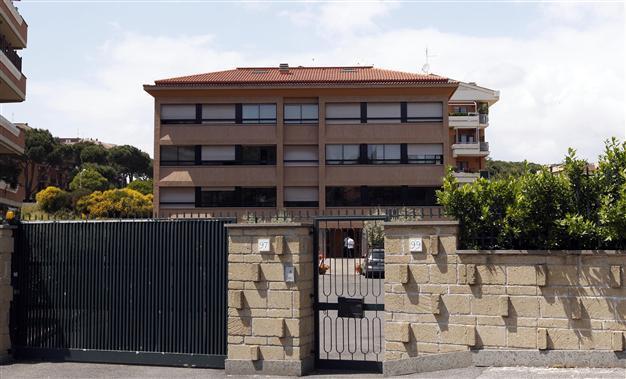Vatican Legion reform in doubt with revelations
VATICAN CITY - The Associated Press

The entrance of the Legion of Christ headquarters in Rome is seen through a gate, Wednesday, May 16, 2012. AP photo
Pope Benedict XVI's ability to reform the troubled Legion of Christ has again been thrown into doubt following revelations that a half-dozen priests are under Vatican investigation for allegedly molesting children and that the order's leadership knew its most prominent priest had fathered a child yet did nothing to prevent him from teaching and preaching about morality.
The Vatican on Thursday expressed confidence in Benedict's delegate running the congregation but acknowledged that the process of reform is "certainly long and complex precisely because it aims to be profound." Vatican spokesman the Rev. Federico Lombardi rejected suggestions that the revelations proved that the reform process wasn't working and that the Legion was too flawed to be saved.
On the contrary, he told The Associated Press, the revelations showed that the Legion under papal delegate Cardinal Velasio De Paolis is doing the right thing by taking action once the revelations became known.
"Even the recent public communications about the Legion seem to be new and a positive sign of transparency," he said. "There is no reason then not to have confidence in the way Cardinal De Paolis is guiding this complex path of renewal." The Rev. Thomas Williams, an American moral theologian who was the public face of the Legion for years, admitted Tuesday he had had a relationship with a woman and had fathered a child "a number of years ago." He didn't identify the woman. The Legion said the child is being cared for.
The Legion subsequently admitted that Williams' superiors knew about the child but didn't remove him immediately from his prominent role as a professor of moral theology at the Legion's university in Rome and a popular television commentator, author and spokesman. The order has refused to say precisely when Williams' superiors knew, but former Legion priests say they suspect at least some of the Legion's leadership knew years ago.
Williams was only removed from his teaching position in February after a Spanish victims' group confronted the Legion with a letter outlining the allegations against Williams and other Legion priests accused of abusing children. The matter became public after The Associated Press obtained a copy of the letter and last week requested comment from the Legion.
The revelations and apparent cover-up of the initial knowledge of Williams' child have raised questions about whether it's really possible to rehabilitate the Legion, which has been in disarray since admitting in 2009 that its founder had raped and molested seminarians and fathered three children with two women. The order, founded in 1941, became one of the fastest growing and most influential because of its ability to attract money and seminarians to the priesthood. Pope John Paul II held its leader, the Rev. Marcial Maciel, up as a model for the faithful.
The facade, however, began to crumble in 1997, with revelations of Maciel's abuse, but the Mexican prelate continued to enjoy Vatican support and protection. It wasn't until 2006 that the Vatican sanctioned him to a lifetime of prayer and penance for his crimes. He died in 2008.
Benedict took a big risk when he assumed control of the Legion in May 2010 after a Vatican investigation determined that Maciel was a fraud who had created an order bent on silence and obedience to cater to his double life. The Vatican concluded that his order was beset by such problems it could only survive if it were thoroughly "purified." Benedict could have shut the order down, and some critics of the cult-like movement say that remains the only possible solution.
American canon lawyer Edward Peters, the Vatican's expert witness in U.S. sex abuse lawsuits and an adviser to the Vatican's highest court, has concluded the Legion "needs to disappear." But Benedict chose instead to name De Paolis to oversee a process of reform that includes rewriting the order's constitutions, correcting the abuses of power and defining the charism, or the essential spirit of the order that makes it unique. The aim is to preserve whatever good that the order may still provide the church with its 800 priests and zealous lay members.
Two years in, the logistical process of rewriting the constitutions is going ahead. And just this week on the same day the Williams revelations made headlines De Paolis announced that he had named new leaders for the Legion's female branch to help shepherd it through a process of reform as well.
But in yet another indication that the process is anything but linear, none of the members selected by De Paolis are considered reformers, with most, if not all, of them strongly linked to the old guard leadership and with little experience in the field.
Former members of the so-called consecrated branch of the Legion say De Paolis' choices don't reflect the results of the voting undertaken by current members to choose their own leaders. They predicted a new exodus of members frustrated that their efforts to reform had again been rebuffed.
"I believe this will generate numerous and significant desertions," said Nelly Ramirez, a former consecrated woman who left in 2009 and has written a book about her experiences.
Since the revelations about Maciel were first disclosed in 2009, some 350 women out of more than 900, have abandoned the Legion's consecrated branch, where women live like nuns, fundraising, recruiting members and working in schools and youth programs. A group of 35 who have left formed their own group in February that has been canonically approved by the Vatican.
De Paolis has warned current members not to mix with the members of Totus Tuus lay association, lest they be poached away.
